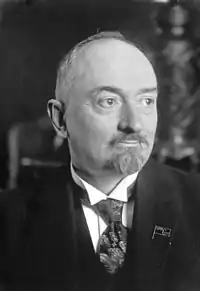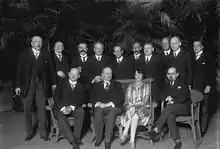Georgy Chicherin
Georgy Vasilyevich Chicherin (24 November 1872 – 7 July 1936), also spelled Tchitcherin, was a Marxist revolutionary and a Soviet politician. He served as the first People's Commissar for Foreign Affairs in the Soviet government from March 1918 to 1930.
Georgy Chicherin Георгий Чичерин | |
|---|---|
 | |
| People's Commissar for Foreign Affairs of the Soviet Union | |
| In office 6 July 1923 – 21 July 1930 | |
| Premier | Vladimir Lenin Alexey Rykov |
| Preceded by | None—post established |
| Succeeded by | Maxim Litvinov |
| People's Commissar for Foreign Affairs of the Russian SFSR | |
| In office 9 April 1918 – 6 July 1923 | |
| Premier | Vladimir Lenin |
| Preceded by | Leon Trotsky |
| Succeeded by | None—post abolished |
| Personal details | |
| Born | 12 November 1872 Kirsanovsky District, Tambov Governorate, Russian Empire |
| Died | 7 July 1936 (aged 63) Moscow, Russian SFSR, Soviet Union |
| Nationality | Soviet |
| Political party | RSDLP (Mensheviks) (1905–1917) All-Union Communist Party (Bolsheviks) (1918–1936) |
| Profession | Diplomat |
Childhood and early career
A distant relative of Aleksandr Pushkin, Georgy Chicherin was born into an old noble family. His father, Vasily N. Chicherin, was a diplomat in the service of the Russian Empire. His uncle Boris Chicherin was an influential legal philosopher and historian. As a young man, Chicherin became fascinated with history as well as classical music, especially Richard Wagner, and with Friedrich Nietzsche, passions that he would pursue throughout his life. He wrote a book about Mozart. He spoke all major European languages and a number of Asian ones.[1] After graduating from St. Petersburg University with a degree in history and languages, Chicherin worked in the archival section of the Russian Ministry for Foreign Affairs from 1897 to 1903.
In 1904 Chicherin inherited the estate of his celebrated uncle, Boris Chicherin, in the Tambov region and became very wealthy. He immediately used his newfound fortune to support revolutionary activities in the runup to the Russian Revolution of 1905 and was forced to flee abroad to avoid arrest later in the year. He spent the next 13 years in London, Paris and Berlin, where he joined the Menshevik faction of the Russian Social Democratic Labor Party and was active in emigre politics. While in Germany, he underwent medical treatment in attempts to cure his homosexuality.[2]
Anti-war activity in Great Britain 1915-1918
With the outbreak of World War I in 1914, Chicherin adopted an antiwar position, which brought him closer to Vladimir Lenin's Bolsheviks. In 1915 he moved to Great Britain where he soon developed a friendship with Mary Bridges-Adams, an activist with the Plebs League and founding member of the Central Labour College. together they found the Russian Political Prisoners and Exiles Relief Committee (RPPERC). This organisation continued a long-standing tradition in British society to support the victims of Tsarist repression, but realigned its focus to build support amongst organised labour rather than through the search for wealthy patrons. The aim of the committee was to was to collect money to send to revolutionaries incarcerated in Tsarist prisons, but under Chicherin's skilful soon ensured that this was extended to cover the broader political aim of systematic agitation against Tsarism itself.[3]
In 1917, he was arrested by the British government for his antiwar writings and spent a few months in Brixton Prison.
Bolshevik government
The Bolsheviks had come to power in Russia after the October Revolution of 1917. The first head of the Commissariat of Foreign Affairs (which had replaced the Ministry of Foreign Affairs), Leon Trotsky, secured Chicherin's release and safe passage to Russia in exchange for British subjects held in Russia at the time, including George Buchanan, the British ambassador.[4] By now, Chicherin was in poor health and overweight.
Upon his return to Russia in early 1918, Chicherin formally joined the Bolsheviks and was appointed Trotsky's deputy during the negotiations that led to the Treaty of Brest-Litovsk. After the treaty was signed in late February 1918, Trotsky, who had advocated a different policy, resigned his position in early March. Chicherin became the acting head of the Commissariat and was appointed Commissar for Foreign Affairs on 30 May. On 2 March 1919 he was one of five men chairing the first congress of Comintern.[5]
Chicherin followed a pro-German foreign policy in line with his anti-British attitudes. He had developed them during his time in the foreign ministry, when Britain was blocking Russian expansion in Asia. He even suggested to Lenin that English workers should be formed into volunteer units. That was in 1920, when Soviet armies were nearing Warsaw. Lenin agreed but nothing came of it.
In July 1918 his close friend, Count Brockdorff-Rantzau, became the new German ambassador after his predecessor, Count Wilhelm Mirbach, was shot in the Left SR uprising.[6]
In 1922, Chicherin participated in the Genoa Conference and signed the Treaty of Rapallo with Germany. He begged Lenin not to wreck the Genoa Conference (he believed this would make it easier to get foreign loans). He pursued a policy of collaboration with Germany and developed a closer working relationship with Ulrich Graf von Brockdorff-Rantzau. During this period, he also held diplomatic negotiations with nuncio Eugenio Pacelli, the future Pope Pius XII, on the status of the Roman Catholic Church in the newly formed Soviet Union.
Chicherin is thought to have had more phone conversations with Lenin than anyone else. When Joseph Stalin replaced Lenin in 1924 he continued to be Stalin's foreign minister. Stalin valued Chicherin's opinions. In 1928 Chicherin stated that he wanted an improved relationship with the capitalist countries to encourage foreign investment. This policy had Stalin's enthusiastic support and was approved by the Politburo in late 1927 and early 1928. Stalin said: "it can hardly be doubted that Comrade Chicherin is better informed about the mood in foreign investment circles that any of us."[7] Although known for his workaholic habits he became sidelined because from November 1926 to June 1927, and from September 1928 until January 1930 Chicherin was receiving medical treatment in Germany or the French Riviera.[8] Chicherin showed considerable courage in writing letters criticizing current politicians and the policies that were being pursued. In February 1927, Chicherin criticized Nikolai Bukharin for his speeches that had a negative attitude to the relationship between the USSR and Germany. ‘This was particularly dangerous because of the deterioration of the relationship between the USSR and Britain.’ Chicherin said: ‘At a time when the British are working against us, we must take care of our relationship with other states. We have to nurture such relationships.’
On 3 June 1927 Chicherin, while in a sanatorium in Germany, wrote about incidents that were detrimental to Soviet-German relations. Chicherin was exasperated "by some comrades who can do no better than ruin all our work by attacking Germany, spoiling everything once and for all."[9] When Kliment Voroshilov, at the May Day Parade in 1929, made a speech attacking the Weimar Republic, Chicherin dispatched a letter to the Politburo stating that the speech would do irreparable damage to German-Soviet relations.
Chicherin played a major role in establishing formal relations with China, and in designing the Kremlin's China policy. He focused on the Chinese Eastern Railway, Manchuria, and the Mongolian issue.[10]
Last years
In 1930 Chicherin was formally replaced by his deputy, Maxim Litvinov. A continuing terminal illness burdened his last years, which forced him away from his circle of friends and active work and led to an early death. When Chicherin died in 1936 the official Communist newspaper Izvestiya, summarising his character, described him as highly educated, an exceptional diplomat and a sophisticated art lover.[11] After his death and until the Khrushchev Thaw, he was rarely mentioned in Soviet literature, although he was mentioned in the Soviet Diplomatic dictionary, in an article occupying 52 pages in the 1950 edition, compared with Litvinov's 92 pages and Vyacheslav Molotov's 292.[12]
 Chicherin, in the center, between the German foreign minister Stresemann, and his wife, in Berlin, 1928, in a break from the negotiations German-Lithuanian-Soviet
Chicherin, in the center, between the German foreign minister Stresemann, and his wife, in Berlin, 1928, in a break from the negotiations German-Lithuanian-Soviet The Chicherin monument in Kaluga on the street in his name
The Chicherin monument in Kaluga on the street in his name
References
- G. Gorodetsky, Soviet Foreign Policy 1917-1991: A Retrospective (London, 1994), p.23, ISBN 0-7146-4506-0
- Baron Alexander Meyendorff, "My Cousin, Foreign Commissar Chicherin." Russian Review, Vol. 30, No. 2 (Apr., 1971), pp. 173—178
- Grant, Ron (1984). British radicals and socialists and their attitudes to Russia, c.1890-1917 (PDF) (PhD thesis). Glasgow: University of Glasgow. Retrieved 3 December 2020.
- Also intervening in London directly with David Lloyd George on Chicherin's behalf was Vladimir Rosing, a Russian singer and political activist with high connections. Rosing's controversial secret meeting with Lloyd George was the subject of a House of Commons Debate on January 15, 1918. Bonar Law, Leader of the House of Commons, was questioned by an MP, Joseph King, whether or not Lloyd George had secretly met with Rosing to discuss Chicherin's release. Bonar Law stated that he was told that no such meeting took place. Rosing's personal memoirs confirm that it did.
- Dmitri Volkogonov, The rise and fall of the Soviet Empire, p. 45
- Dmitri Volkogonov, The rise and fall of the Soviet Empire, pp 38-40
- Reiman, Michal: Birth of Stalinism, pp.39-40 John Holroyd-Doveton Maxim Litvinov p 99
- John Holroyd-Doveton,Maxim Litvinov pp. 85 &. 99
- O’Connor , Timothy: Diplomacy and Revolution, pp. 154-158 & 162 John Holroyd-Doveton, Maxim Litvinov pp. 97 & 98
- Anastasiya Kartunova, "Georgy Chicherin's Role in the Chinese Policy of Soviet Russia." Far Eastern Affairs (2014) 42#4 pp 92-119.
- Izvestiya, 8 July 1936, p.2
- Roy Medvedev, Let History Judge: The Origins and Consequences of Stalinism (London, 1971), p.202, ISBN 0-394-44645-3 Craig Gordon The Diplomats p.375 John Holroyd-Doveton Maxim Litvinov p 471
Sources and further reading
| Wikisource has original text related to this article: |
- Debo, Richard K. "The Making of a Bolshevik: Georgii Chicherin in England 1914–1918," Slavic Review, vol. 25, no. 4 (Dec. 1966), pp. 651–662. In JSTOR.
- Grant, Ron. "G.V. Chicherin and the Russian revolutionary cause in Great Britain." Immigrants & Minorities 2.3 (1983): 117–138.
- Hodgson, Robert. "Commissar Chicherin." History Today (Sep 1954) 4#9 pp 613-617
- O'Connor, Timothy Edward. Diplomacy and Revolution: G.V. Chicherin and Soviet Foreign Affairs, 1918–1930, Ames, Iowa State University Press, 1988.
- O'Connor, Timothy E. "G. V. Chicherin and the Soviet View of the League of Nations in the 1920s" European Studies Journal (1989), 6#1 pp 1–17.
- Rosenbaum, Kurt. Community of Fate: German-Soviet Diplomatic Relations 1922–1928 (Syracuse University Press, 1965).
External links
| Political offices | ||
|---|---|---|
| Preceded by Leon Trotsky |
People's Commissar for Foreign Affairs 1918–1930 |
Succeeded by Maxim Litvinov |
